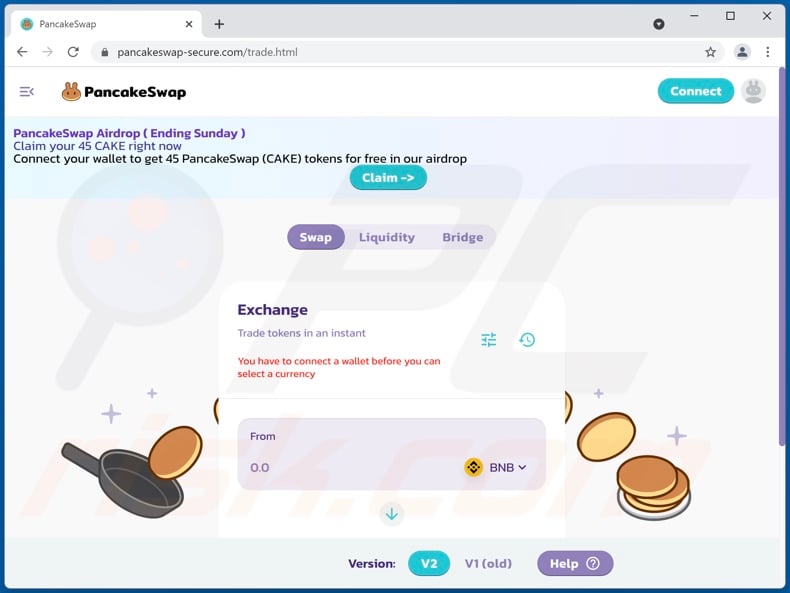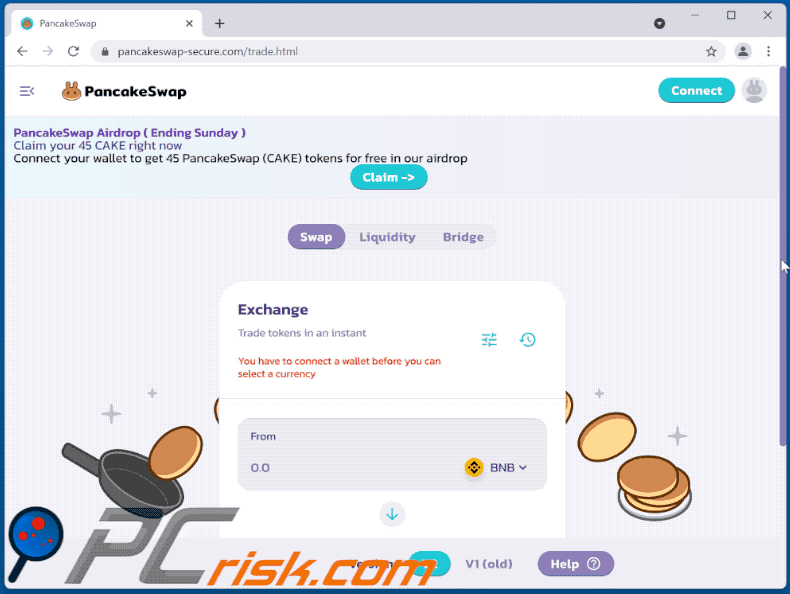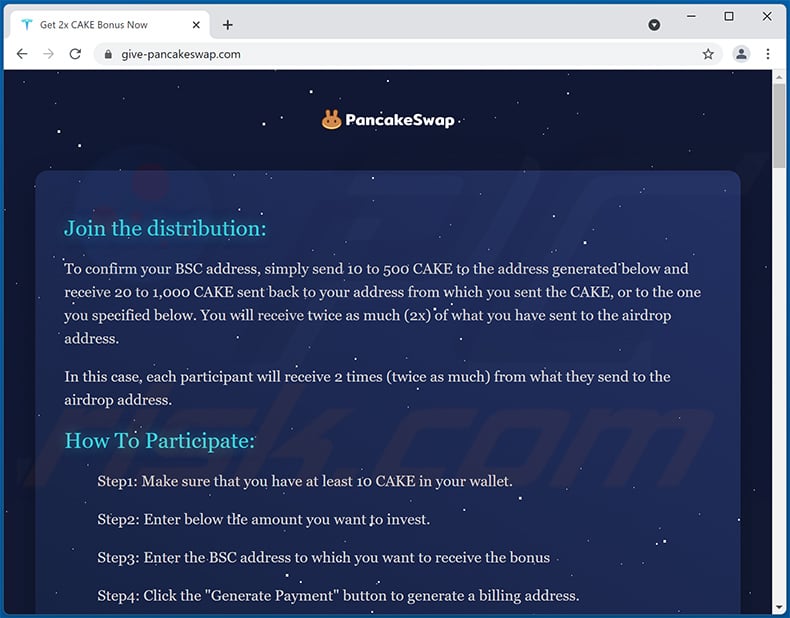Avoid getting scammed by the fake "PancakeSwap AirDrop" giveaway
Phishing/ScamAlso Known As: PancakeSwap AirDrop scam website
Get free scan and check if your device is infected.
Remove it nowTo use full-featured product, you have to purchase a license for Combo Cleaner. Seven days free trial available. Combo Cleaner is owned and operated by RCS LT, the parent company of PCRisk.com.
What is "PancakeSwap AirDrop"?
"PancakeSwap AirDrop" is the name of yet another cryptocurrency giveaway scam. This scheme promises to give users 45 PancakeSwap (CAKE) tokens if they connect their digital wallets to it.
It must be emphasized that these claims are fake, and users who trust them - will not receive any tokens. Instead, users are likely to experience financial loss by attempting to take part in this fake giveaway.

"PancakeSwap AirDrop" scam overview
Typically, scams like "PancakeSwap AirDrop" request users to contribute a relatively small amount of cryptocurrency for a huge payout. In this case, the scheme promises 45 CAKE tokens that, at the time of writing, are worth over 800 US dollars (note, exchange rates constantly fluctuate). However, whatever the amount users transfer to such scams - they lose it and receive nothing in return.
Alternatively, these schemes may aim to gain access and control over victims' digital wallets and all of the cryptocurrency held within them.
In summary, by trusting the "45 PancakeSwap AirDrop" scam, users can experience financial loss, privacy issues, and other serious problems.
| Name | PancakeSwap AirDrop scam website |
| Threat Type | Phishing, Scam, Social Engineering, Fraud |
| Fake Claim | Scam claims that users who connect their digital wallets to it - will receive PancakeSwap (CAKE) tokens for free. |
| Related Domains | pancakeswap-reward[.]live, pancakeswap-secure[.]com, give-pancakeswap[.]com |
| Detection Names (pancakeswap-secure[.]com) | Emsisoft (Phishing), Spamhaus (Phishing), Fortinet (Spam), Full List Of Detections (VirusTotal) |
| Symptoms | Fake error messages, fake system warnings, pop-up errors, hoax computer scan. |
| Distribution methods | Compromised websites, rogue online pop-up ads, potentially unwanted applications. |
| Damage | Loss of sensitive private information, monetary loss, identity theft, possible malware infections. |
| Malware Removal (Windows) |
To eliminate possible malware infections, scan your computer with legitimate antivirus software. Our security researchers recommend using Combo Cleaner. Download Combo CleanerTo use full-featured product, you have to purchase a license for Combo Cleaner. 7 days free trial available. Combo Cleaner is owned and operated by RCS LT, the parent company of PCRisk.com. |
Online scams in general
With the rise in popularity of cryptocurrency, the online world is seeing more and more digital currency related scams. There are countless fake crypto giveaways on the Web; "Ripple Giveaway", "Polkadot giveaway", "BTC giveaway", and "SOLANA (SOL) Giveaway" are just a few examples.
In general, the Internet is full of misleading, deceptive, and even malicious content. In addition to hoax cryptocurrency giveaways, there are - fake warnings that users' devices are infected, alerts that essential software is outdated or missing, fraudulent lotteries, and so on. Therefore, it is strongly advised to exercise caution when browsing.
How did potentially unwanted applications install on my computer?
Rogue and deceptive websites are seldom accessed intentionally. Should a browser be force-opening such pages - it is likely due to installed PUAs (Potentially Unwanted Applications). Furthermore, these apps can have other harmful abilities (e.g., adware, browser hijackers, etc.).
PUAs usually infiltrate systems stealthily. They are spread by using the "bundling" marketing technique - packing regular programs with unwanted/malicious supplements. Rushed downloads/installations increase the risk of allowing bundled content into the device.
Intrusive advertisements proliferate PUAs as well. Once clicked on, they can execute scripts to make downloads/installations without user consent. Select PUAs also have "official" promotional/download webpages.
How to avoid installation of potentially unwanted applications?
It is recommended to research software and download it from official/verified channels. Dubious sources, e.g., unofficial and freeware websites, Peer-to-Peer sharing networks, etc. - often offer bundled content.
When downloading/installing, it is advised to read terms, explore available options, use the "Custom/Advanced" settings, and opt-out from all additions. Intrusive adverts appear legitimate; however, they redirect to questionable sites (e.g., adult-dating, gambling, pornography, etc.).
In case of encounters with ads and/or redirects of this kind, the system must be checked and all suspect applications and browser extensions/plug-ins detected - immediately removed from it. If your computer is already infected with PUAs, we recommend running a scan with Combo Cleaner Antivirus for Windows to automatically eliminate them.
Text presented in "PancakeSwap AirDrop" scam:
Connect
PancakeSwap Airdrop ( Ending Sunday )
Claim your 45 CAKE right nowConnect your wallet to get 45 PancakeSwap (CAKE) tokens for free in our airdrop
Claim -> Swap Liquidity -> Bridge
Exchange
Trade tokens in an instant
You have to connect a wallet before you can select a currency
From
0.0
To
0.0
Unlock Wallet
Version: V2 V1 (old) Help
The appearance of "PancakeSwap AirDrop" pop-up scam (GIF):

Another example of PancakeSwap-themed scam website:

Text presented within:
Join the distribution:
To confirm your BSC address, simply send 10 to 500 CAKE to the address generated below and receive 20 to 1,000 CAKE sent back to your address from which you sent the CAKE, or to the one you specified below. You will receive twice as much (2x) of what you have sent to the airdrop address.In this case, each participant will receive 2 times (twice as much) from what they send to the airdrop address.
How To Participate:
Step1: Make sure that you have at least 10 CAKE in your wallet.
Step2: Enter below the amount you want to invest.
Step3: Enter the BSC address to which you want to receive the bonus
Step4: Click the "Generate Payment" button to generate a billing address.
Step5: Send 10 to 500 CAKE to the generated address.
Step6: Wait at least 4-8 minutes after confirming the transaction and get back to your wallet twice as much (2x) CAKE of the amount sent.
The bonus will be sent to the address you entered, or to the one from which you sent the CAKE.
Yet another example of PancakeSwap airdrop-themed scam website (pancakesswap[.]online):
![PancakeSwap airdrop-themed scam website (pancakesswap[.]online)](/images/stories/screenshots202411/pancakeswap-airdrop-pop-up-scam-update-2024-11-22-another-variant.jpg)
Instant automatic malware removal:
Manual threat removal might be a lengthy and complicated process that requires advanced IT skills. Combo Cleaner is a professional automatic malware removal tool that is recommended to get rid of malware. Download it by clicking the button below:
DOWNLOAD Combo CleanerBy downloading any software listed on this website you agree to our Privacy Policy and Terms of Use. To use full-featured product, you have to purchase a license for Combo Cleaner. 7 days free trial available. Combo Cleaner is owned and operated by RCS LT, the parent company of PCRisk.com.
Quick menu:
- What is PancakeSwap AirDrop scam website?
- How to identify a pop-up scam?
- How do pop-up scams work?
- How to remove fake pop-ups?
- How to prevent fake pop-ups?
- What to do if you fell for a pop-up scam?
How to identify a pop-up scam?
Pop-up windows with various fake messages are a common type of lures cybercriminals use. They collect sensitive personal data, trick Internet users into calling fake tech support numbers, subscribe to useless online services, invest in shady cryptocurrency schemes, etc.
While in the majority of cases these pop-ups don't infect users' devices with malware, they can cause direct monetary loss or could result in identity theft.
Cybercriminals strive to create their rogue pop-up windows to look trustworthy, however, scams typically have the following characteristics:
- Spelling mistakes and non-professional images - Closely inspect the information displayed in a pop-up. Spelling mistakes and unprofessional images could be a sign of a scam.
- Sense of urgency - Countdown timer with a couple of minutes on it, asking you to enter your personal information or subscribe to some online service.
- Statements that you won something - If you haven't participated in a lottery, online competition, etc., and you see a pop-up window stating that you won.
- Computer or mobile device scan - A pop-up window that scans your device and informs of detected issues - is undoubtedly a scam; webpages cannot perform such actions.
- Exclusivity - Pop-up windows stating that only you are given secret access to a financial scheme that can quickly make you rich.
Example of a pop-up scam:

How do pop-up scams work?
Cybercriminals and deceptive marketers usually use various advertising networks, search engine poisoning techniques, and shady websites to generate traffic to their pop-ups. Users land on their online lures after clicking on fake download buttons, using a torrent website, or simply clicking on an Internet search engine result.
Based on users' location and device information, they are presented with a scam pop-up. Lures presented in such pop-ups range from get-rich-quick schemes to fake virus scans.
How to remove fake pop-ups?
In most cases, pop-up scams do not infect users' devices with malware. If you encountered a scam pop-up, simply closing it should be enough. In some cases scam, pop-ups may be hard to close; in such cases - close your Internet browser and restart it.
In extremely rare cases, you might need to reset your Internet browser. For this, use our instructions explaining how to reset Internet browser settings.
How to prevent fake pop-ups?
To prevent seeing pop-up scams, you should visit only reputable websites. Torrent, Crack, free online movie streaming, YouTube video download, and other websites of similar reputation commonly redirect Internet users to pop-up scams.
To minimize the risk of encountering pop-up scams, you should keep your Internet browsers up-to-date and use reputable anti-malware application. For this purpose, we recommend Combo Cleaner Antivirus for Windows.
What to do if you fell for a pop-up scam?
This depends on the type of scam that you fell for. Most commonly, pop-up scams try to trick users into sending money, giving away personal information, or giving access to one's device.
- If you sent money to scammers: You should contact your financial institution and explain that you were scammed. If informed promptly, there's a chance to get your money back.
- If you gave away your personal information: You should change your passwords and enable two-factor authentication in all online services that you use. Visit Federal Trade Commission to report identity theft and get personalized recovery steps.
- If you let scammers connect to your device: You should scan your computer with reputable anti-malware (we recommend Combo Cleaner Antivirus for Windows) - cyber criminals could have planted trojans, keyloggers, and other malware, don't use your computer until removing possible threats.
- Help other Internet users: report Internet scams to Federal Trade Commission.
Frequently Asked Questions (FAQ)
What is a pop-up scam?
Pop-up scams are messages intended to trick users into performing specific actions (e.g., transferring cryptocurrency, disclosing sensitive information, calling fake helplines, downloading files, purchasing products, etc.).
What is the purpose of a pop-up scam?
The purpose of pop-up scams is typically to generate revenue for their designers. How they achieve this varies, e.g., deceive users into making monetary transactions, sell disclosed vulnerable data, proliferate malware, and so on.
I have lost cryptocurrency to the "PancakeSwap AirDrop" scam, can I get my money back?
Cryptocurrency transactions are practically untraceable; hence, you will be unable to reverse them.
Why do I encounter fake pop-ups?
Pop-up scams are hosted on rogue/malicious sites, which are seldom entered intentionally. Most users access them via redirects caused by dubious webpages, intrusive advertisements, or harmful apps already installed onto their devices.
Will Combo Cleaner protect me from pop-up scams?
Combo Cleaner can scan visited websites and detect suspicious and malicious ones. Scam-endorsing sites also fall within this category; therefore, you will be alerted immediately, and access to such pages will be restricted.
Share:

Tomas Meskauskas
Expert security researcher, professional malware analyst
I am passionate about computer security and technology. I have an experience of over 10 years working in various companies related to computer technical issue solving and Internet security. I have been working as an author and editor for pcrisk.com since 2010. Follow me on Twitter and LinkedIn to stay informed about the latest online security threats.
PCrisk security portal is brought by a company RCS LT.
Joined forces of security researchers help educate computer users about the latest online security threats. More information about the company RCS LT.
Our malware removal guides are free. However, if you want to support us you can send us a donation.
DonatePCrisk security portal is brought by a company RCS LT.
Joined forces of security researchers help educate computer users about the latest online security threats. More information about the company RCS LT.
Our malware removal guides are free. However, if you want to support us you can send us a donation.
Donate
▼ Show Discussion